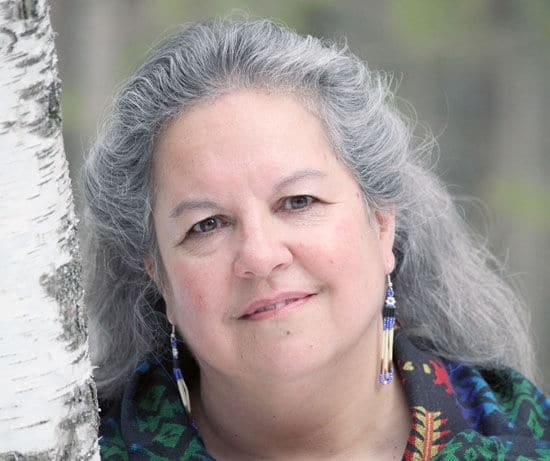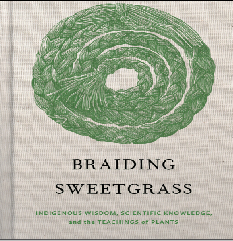
Robin Wall Kimmerer, the author of the widely acclaimed
Braiding Sweetgrass
gave a talk on Sept. 5 on Indigenous environmental science, highlighting the urgency to evolve our relationship with our environment and land. Kimmerer, who was invited by the College’s Biology Department, left some attendees in tears and received a two minute standing ovation — an indication that her words greatly impacted her audience.
The evening started with Chair of the Biology Department Jason Townsend acknowledging the Oneida Nation and its contributions to Hamilton’s campus. Townsend mentioned Hamilton’s unpaid debt to native communities and emphasized the importance of indigenous voices in the scientific field, setting the tone for the evening.
Kimmerer followed by speaking in the Pawnee language to acknowledge and pay her respects to the Oneida Nation. She highlighted the importance of love, intimacy and care within Indigenous communities. Kimmerer, drawing on her unique background as an Indigenous woman, educator and scientist, discussed how the frontiers of Indigenous and Western science could be used to address the worsening climate situation. Among a new surge of environmental movements and activism from different Indigenous groups, she illustrated the need for systemic change and action.
Kimmerer’s book comprehensively explains how the history of colonization and racial oppression has contributed to our environmental situation today. In it, she details the differences between Western and Indigenous sciences and how their competing approaches to land and territory have contributed to our degrading environment.
Kimmerer started her talk by challenging the West’s prevailing economic and capitalistic mentality, which she said is focused more on “What more can we take?” than “What does the earth ask of us?” She highlighted how her Indigenous community has a very advanced understanding of land and its uses. She also discussed how for them, land is not territory, but “a source of identity, a source of sustenance, a library of knowledge and a vessel for the spirits of their ancestors.” Land is not something to be conquered, but to be shared and respected. Kimmerer tied this into the West’s belief of human exceptionalism and how humans are seen as being the top of the evolutionary hierarchy. Contrary to the West’s belief, Kimmerer’s communities see everything as being imbued with some type of spiritual significance. The wind, the water and the plants are a means to connect with nature and to value its contributions.
She continued by contrasting the “indigenous paradigm,” with nature as a subject, against the Western paradigm, with nature as an object. Rather than objectifying nature, Kimmer urges us to personify it. In her own work, Kimmerer took inspiration from the Indigenous practice of braiding wiingashk (sweetgrass), which is seen as mother earth’s hair, to express love and respect.
Kimmerer cited a 2019 United Nations report showing that biodiversity decline is lowest in native lands due to Indigenous land management, integration of well-being of both land and people, long-term monitoring and response and cultural values. However, the reality is also that only 10% of these Indigenous communities have claim over their land, depicting the lack of equity.

Braiding Sweetgrass
received wide acclaim. It is a
New York Times
bestseller, and recipient of the Sigurd F. Olson Nature Writing Award. Photo courtesy of robinwallkimmerer.com.
Regarding future measures that can be taken, Kimmerer outlined three main ideas towards the end of her talk: land justice, changing conversations and decolonizing education.
Firstly, Indigenous people must rightfully be given land titles and compensation. Land justice extends beyond acknowledgments and into reciprocation, not just for people but also for the land itself. Kimmerer mentioned how in Ecuador and New Zealand, some pieces of land now have their own rights and how the respective indigenous communities of this land have the right to mediate what happens to the land. This is in stark contrast with the Western world, where the only things that have rights are corporations and people, she said.
Kimmerer also mentioned how modern day discussions regarding the environment and sustainability are mainly focused on things like recycling, reducing carbon emissions and green energy. While these things are important, Kimmerer argued, the main thing that needs to evolve is our relationship with the land that we live on. We need to redefine the word “sustainability” to incorporate the Indigenous practice of “the honorable harvest,” including principles like “self restraint, asking permission, listening for answers, using everything taken, showing gratitude, sharing and minimizing harm” when taking resources.
Kimmerer also urged professors, faculty members and administrators to start with making changes in their classrooms and campuses. A balanced and equitable future for all starts with enriching the knowledge of the indigenous. Empowerment begins with education which isn’t possible without amplifying the voices of marginalized people.
For many, Kimmerer’s talk prompted a reevaluation of Hamilton’s role in the oppression of Indigenous communities in a world grappling with the consequences of environmental degradation and climate change. On a campus where the “American Indian or Alaska Native, non-Hispanic” demographic category is made up of one single student, her message was even more poignant.
















